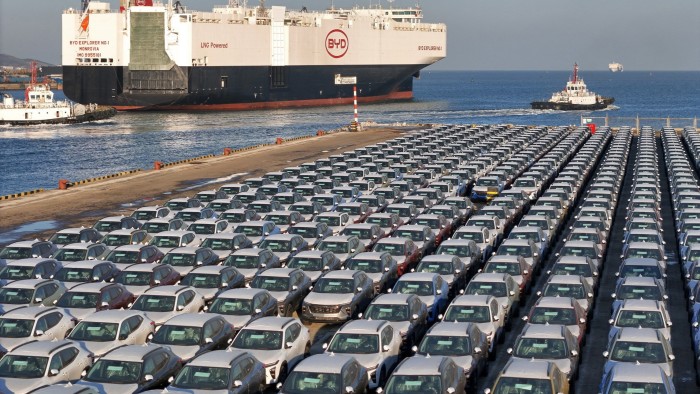China’s EV price war set to intensify next year as BYD squeezes suppliers

Stay informed with free updates
Simply sign up to the Electric vehicles myFT Digest — delivered directly to your inbox.
BYD, Tesla’s biggest rival in China, has demanded its suppliers slash prices by 10 per cent, as the world’s largest auto market braces for a fresh salvo in a cut-throat price war.
The carmaker urged its suppliers to send over their quotes by December 15 and officially mark down prices starting next year, executive vice-president He Zhiqi wrote in an email circulated on social media on Wednesday.
“In 2025, the EV market . . . will go into a grand final battle and a knockout tournament,” he said. “To enhance BYD cars’ competitiveness . . . you and your team must take it seriously and effectively exploit space for cost reduction.”
The Warren Buffett-backed carmaker’s request has sparked outrage among the country’s auto parts makers, which are already suffering razor-thin margins and extended payment cycles.
“The rise of China’s auto industry cannot come at the expense of the livelihood of domestic workers and suppliers,” one supplier responded. “We are unable to accept your company’s request and unwilling to take part in this type of co-operation that violates business ethics and human nature.”
In the first nine months of 2024, the average time BYD took to clear its bills payable, most of which were attributed to suppliers, was 144 days, longer than the 124 days a year earlier, according to company filings.
“It is a common industry practice to bargain with suppliers over prices on an annual basis,” Li Yunfei, general manager of branding and public relations at BYD, said in a social media post on Wednesday. “The price reduction targets we proposed to our suppliers are not mandatory but negotiable.”
A prolonged price war, initiated by Tesla in late 2022, has squeezed auto groups’ profits and created a wave of industry consolidation. Analysts have predicted that a new round of price cuts would come sooner than usual during the first quarter of 2025.
“Pricing competition [in China’s car market] is inevitable in early 2025,” said Paul Gong, an auto analyst at UBS, adding that major carmakers could not afford to idle production capacity that had been recently increased to meet booming demand.
Earlier this week, Tesla announced a Rmb10,000 ($1,379) discount on its best-selling Model Y sport utility vehicle in China, marking the starting price roughly 4 per cent down to Rmb239,900.
“Even though market demand for EVs is strong, continued overcapacity will still cause everyone in the industry unbearable pain,” said an executive at a Chinese auto part maker who asked to remain anonymous.
“Chinese-made EVs may have the opportunity to replicate Japanese brands’ success to sweep the world, but the process will weed out many players.”
#Chinas #price #war #set #intensify #year #BYD #squeezes #suppliers






